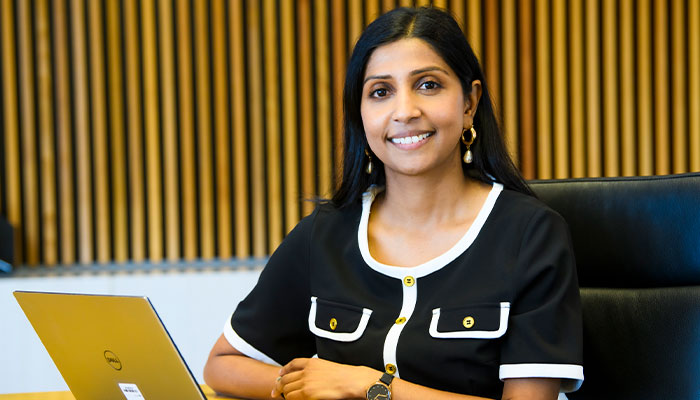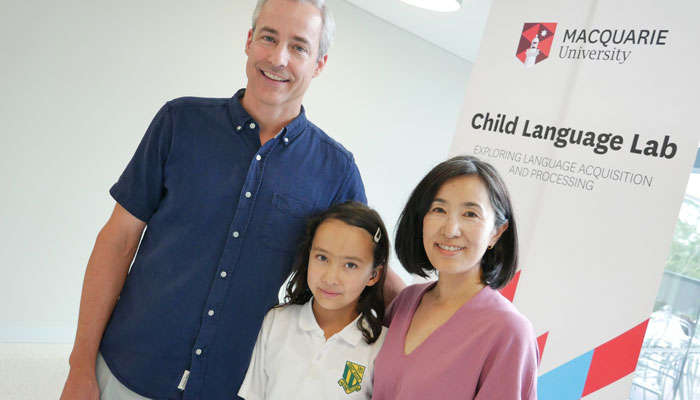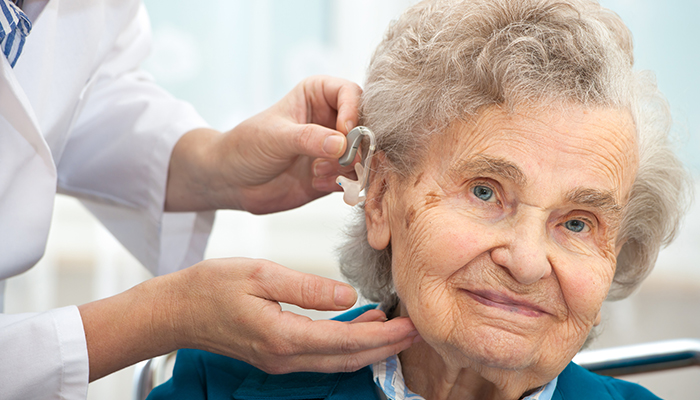The launch of the WHO World Report on Hearing on March 3, World Hearing Day, will point to the urgency for Australia to prevent and address hearing loss across the course of people’s lives, says Professor Catherine McMahon, Macquarie University’s Director of Audiology who is leading the Australian launch of the report.

Testing call: Australia needs to improve the provision of routine hearing checks, beyond our universal newborn screening program, say Macquarie University researchers.
“Australia leads the world in newborn hearing screening, but then we fall short in addressing hearing loss for people’s remaining life stages,” she says.
“Early identification is critical to successful outcomes in people with hearing loss. This report highlights the importance of addressing hearing loss within national health plans.”
McMahon is a co-author on recent research investigating links between successful ageing and loss of vision and hearing, which found that people who experienced hearing impairment aged less successfully over five years.
We know that hearing loss in midlife, from age 45 and over, is the largest modifiable risk factor for a future dementia diagnosis.
The landmark research was led by Professor Bamini Gopinath – a Macquarie University epidemiologist whose research focuses on trends in sensory loss in communities, including health outcomes.
“In this study we defined successful ageing as the absence of a range of chronic diseases (cancer, coronary artery disease and stroke), and the absence of depression, cognitive impairment and functional disability,” says Bamini.
Hearing loss a modifiable dementia risk
The study looked at health assessments on more than 1000 adults aged over 55 taken five years apart under the longitudinal Blue Mountains Eye Study.
The researchers found that 248 study participants (22.9 per cent) had aged successfully and 243 (22.4 per cent) had died.
Those who began the study with moderate and severe hearing handicap at baseline had reduced their likelihood of successful ageing over five years by 50 per cent and 61 per cent respectively.
“We know that hearing loss in midlife, from age 45 and over, is the largest modifiable risk factor for a future dementia diagnosis,” Bamini says.
“Hearing loss doesn’t just affect a person’s ability to communicate, it also has downstream ripple effects on social interaction, employability and mental health,” she says.
Long term impact of hearing loss
Professor Bamini says that the number of vision tests done in older adults far outstrips the number of hearing tests that are done – but it is hearing loss that can have the biggest impact.

Ageing well: We all need to recognise that hearing and communication is important for good health in later years, says Professor Catherine McMahon.
“This is the first study internationally to compare sensory loss, dual sensory loss and ageing status, over a longer term,” Bamini explains.
She says the research strongly supports findings from international studies which have shown hearing loss is the biggest modifiable risk factor for dementia.
“Our findings confirm how important it is that we look at hearing loss as part of a holistic assessment of older adults and as part of the routine health checks people have as they get older,” she says.
“The evidence shows hearing loss affects whether someone reaches old age disease-free and fully functional.”
Greater investment needed
Professor McMahon says that Australia needs to improve the provision of routine hearing checks, beyond our universal newborn screening program.
“Unaddressed hearing loss costs Australia $20 billion annually – most in lost productivity and healthcare costs,” she says.
“More needs to be done to ensure early detection and to connect those with hearing problems to ear and hearing care – particularly for Aboriginal and Torres Strait Islander children and older adults. We’ve got a lot more to do,” she says.
- Mind-reading test validates remarkable world of synaesthetes
- Please explain: Why does the world need poetry?
The Federal Government last year announced hearing health initiatives totalling $21.2 million over five years which include health awareness campaigns, research and service delivery.
However, McMahon says that hearing loss isn’t routinely included in any ‘life checks’ beyond newborn hearing.
“The World Report on Hearing shows that hearing loss is a massive, largely unaddressed, public health problem which is expected to increase from one in five people now, to one in four by 2050,” she says.
“Australia needs to put hearing checks into health checks – we all need to recognise that hearing and communication is important for good health.”
Challenges of commercial screening
Professor Simon Willcock is a general practitioner and Director of Primary Care at Macquarie University Hospital, and says that there are structural issues around the way that we screen for hearing loss, which may contribute to these low rates.
He says that educating GPs on hearing loss won’t solve the problem. “In practice, GPs don’t have sophisticated tools to measure hearing loss, and would refer that on,” he says.
Unaddressed hearing loss costs Australia $20 billion annually – most in lost productivity and healthcare costs.
Simon says that while vision screening by an optometrist is supported by Medicare, hearing tests are not; and so, audiology clinics which offer free hearing screening usually subsidise this through sales of hearing aids.
“Hearing loss has been completely captured and commercialised by an industry that has nothing to do with medicine,” he says.
He says that GPs have little involvement with hearing when it sits outside the health system.
“We hear anecdotally from our patients about their journeys around hearing loss, we see them when we treat infections or syringe their ears – but we’re not included in the management once our patient has a hearing aid.”
Screening by talking
Professor Bamini says one of the main drivers for people to get their hearing tested is when their family members raise the issue of hearing loss and encourage them to visit their doctor.

Sensory imbalance: Professor Bamini Gopinath (pictured) says the number of vision tests done in older adults far outstrips the number of hearing tests.
She is working with Willcock and McMahon on further research to help GPs to screen for hearing loss through questioning their patients and making sure they get testing.
“GPs already have some age-based screening templates for their patients,” says Willcock.
He says that he hasn’t taken a hearing test himself yet, “but when I do, it will almost certainly show I've got some age-related hearing loss.”
- Which of these 19 Australian ecosystems will succumb to climate change first?
- A stargazer's guide to 2021
GPs are often asked to help patients make a decision about getting hearing aids – and Willcock says it’s all about finding the balance. If hearing loss interferes with their normal life, then the person’s ability to hear better overcomes the nuisance value of the hearing device.
“We do know that hearing loss is one of the prime predictors for cognitive loss or dementia in later life; the question is, how do we address this in a way that's cost-effective for patients and delivers the results they need?”
Australia's Hearing Awareness Week is on from March 1 to March 7.
Professor Catherine McMahon is Director of Audiology at MQ Health.
Professor Bamini Gopinath is an epidemiologist at Macquarie University Hearing.
Professor Simon Willcock is Director of Primary Care at MQ Health.



